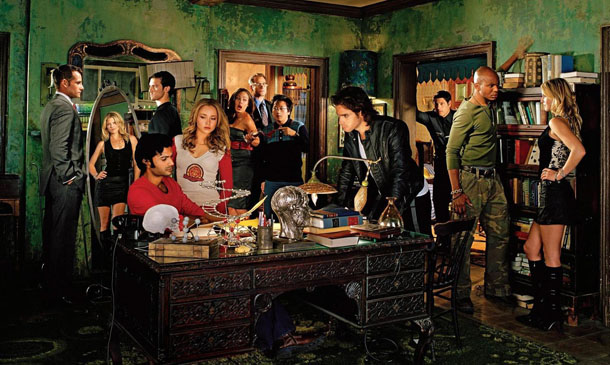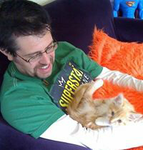PURE GOLDER With Great Power Comes Great Scripting Problems
None
Why SFX.co.uk editor Dave Golder wants to stop screaming “Why the hell aren’t you using your superpowers?” at the TV screen

Superpowers on TV clearly come with an on/off switch. And it’s one mostly used by the writers rather than the characters.
There are so many cases where you find yourself screaming at the screen, “Just use your bloody powers, will you?!” Like whenever telepathic Daphne in No Ordinary Family almost gets tricked or duped by some bloke who clearly has bad intentions in mind. Or when The Vampire Diaries ’ Damon Salvatore (who can easily what somebody’s whispering on the opposite side of the emo-rock-infused Mystic Grill) oddly loses the use of his super lugs whenever there’s an intruder in the house. Or when Peter Petrelli turns into the human Swiss army knife in the first season of Heroes , then barely uses any of the powers he’s acquired, despite having one for every occasion.
These are not nitpicks. These are the kind of questions my Dad asks, and he’s usually paying more attention to his latest globe-shaped jigsaw than following the plots of whatever’s on TV. “Why doesn’t that kid who can affect control electrical stuff just jam the lift/turn off the machine/make the Christams tree lights spell out, ‘Help me’?” he’ll go. Or, “Why can’t that girl who can learn anything learn how to act?”
This is, of course, nothing new. Superpowers have been tightly rationed on TV since the days of George Reeves’ Adventures Of Superman , who would never leap a tall building if a quick jog around the block would do. I remember as a kid being infuriated that Manimal didn’t change into a bird and fly everywhere or into a rhino every time he came across a locked door.
Part of the problem is budgetary constraints. That’s why so few TV capes fly. You only have to watch Lois And Clark to see problems superflight caused for a TV show in the pre-CG days. Not only was it so expensive to achieve that then writers had to tie themselves up in knots to find reasons for Superman not to fly, it also looked crap when he did. The writers also had to avoid any villains who could fly too, because an aerial battle between Superman and The Bilious Bumblebee (or whoever) could have ended up looking like Thunderbirds filmed in a howling gale.
You’ve got to give due credit to Smallville , though – the whole central concept of having Clark learn about and develop his powers over the course of the show has been one of the handiest excuses to keep flying to a minimum ever devised. It’s also given the moments when he has flown a lot more impact and resonance.
Weekly digests, tales from the communities you love, and more
The other problem is simply that superpowers can rob drama of drama. If you’re creating a superhero show for the small screen, telepathy may seem like a good option, because it’s cheap. No special effects needed, just actors who can look either vacant or constipated (depending on how far your show is making use of that old “powers are a curse!” chestnut). Trouble is, this seemingly simple powers comes loaded with plothole potential. When you have a character who can read minds, what’s to stop them second guessing every other person in the plot? How come they can’t hear the thoughts of that intruder in the house or person sneaking up behind them? How can any other character ever keep a secret from them? Secrets are such a major part of creating drama and conflict, that not being able to use them would be crippling.
It’s not just telepathy that’s a problem. Super strength short circuits such classic dramatic situations as being trapped, being restrained, or being shot at. Super speed negates the drama in any race against time scenario. The list goes on. Superpowers are the arch enemy of the scriptwriter.
The test of a good scriptwriter is how they tool up ready for the fight. None of these problems is insurmountable, but they do take writers out of their comfort zone, force them to use new tricks and not rely on the old, tried and trusted TV plot mechanics.
Even then, the genre has managed to generate its own clichés. How many times have TV heroes lost their powers? How many TV heroes have their own form of Kryptonite? How many TV heroes have had to refrain from using their powers for fear of discovery? How many times have we seen powers that that can’t be controlled (step forward Misfits with Curtis’s otherwise-far-too-handy powers of plot reset)?
It’s all about scripting sleight of hand, when it comes down to it. The best shows – and I include Smallville here – distract you from the fact that their characters aren’t using their powers willy-nilly. The worst ones are those where you can’t help but notice.
In the first, David McCallum was constantly invisible, and had to wear clothes and a latex mask to be visible. This meant that becoming invisible was no easy matter; he couldn’t just become invisible, he had to find somewhere to undress and store his stuff. So his “super power” actually came with a inconvenience that added to the fun of the show.
In The Gemini Man , Ben Murphy could only become invisible for a certain amount of time per day; any longer and he’d disintegrate (or something – it was deadly, anyway). Again, this was a concept with built-in tension, that also meant he had to ration his abilities.
Admittedly, if you’re producing a new version of Wonder Woman , or any other existing comic hero, you can’t play with the rules too much (although Smallville did to an extent, and very cleverly), so you’ll need to be cleverer to excuse the fact that you’re hero doesn’t their powers for a spin at every opportunity. But with so many super-powered heroes clogging up TV at the moment, writers are going to step up their game, because, honestly, my dad will notice if the smoke is too thin and the mirrors are cracked.

Dave is a TV and film journalist who specializes in the science fiction and fantasy genres. He's written books about film posters and post-apocalypses, alongside writing for SFX Magazine for many years.


